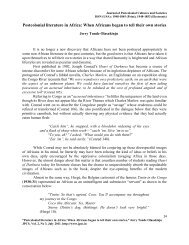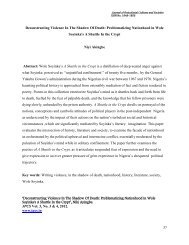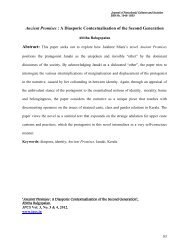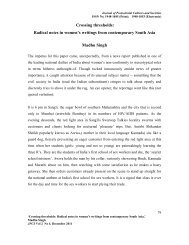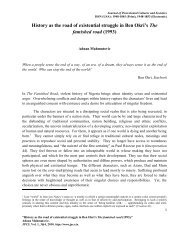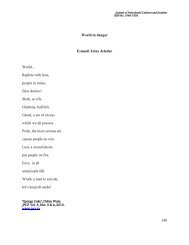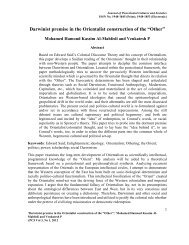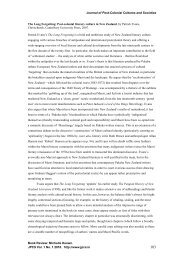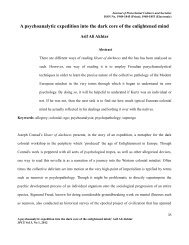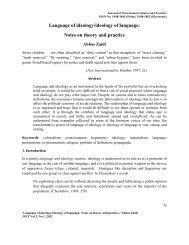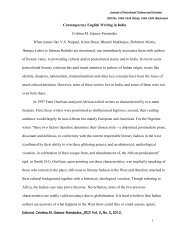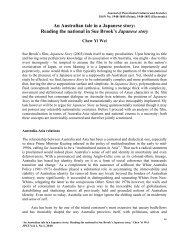The seeds of violence in domesticity: The case of post ... - JPCS
The seeds of violence in domesticity: The case of post ... - JPCS
The seeds of violence in domesticity: The case of post ... - JPCS
Create successful ePaper yourself
Turn your PDF publications into a flip-book with our unique Google optimized e-Paper software.
Journal <strong>of</strong> Postcolonial Cultures and Societies<br />
ISSN (USA): 1948-1845 (Pr<strong>in</strong>t), 1948-1853 (Electronic)<br />
reservation concern<strong>in</strong>g the so-called Backwards started by the Mandal commission s<strong>in</strong>ce the<br />
1990s (hence the mandalisation <strong>of</strong> India). If the debate <strong>in</strong> the film on the possible <strong>in</strong>clusive value<br />
<strong>of</strong> family adoption might recall communalism, one can wonder if the passage from the domestic<br />
(or family) circle would <strong>in</strong>struct de facto dissimilarity or cont<strong>in</strong>uity.<br />
<strong>The</strong> answer to this query should consider how the honour <strong>of</strong> a family depends on the<br />
identity <strong>of</strong> its acquired members. Thus <strong>in</strong> the 70s Indian c<strong>in</strong>ema dealt extensively with the theme<br />
<strong>of</strong> a daughter-<strong>in</strong>-law which because <strong>of</strong> various reasons had entered the family circle with an<br />
assumed identity. Such is, for example, the dramatic kernel <strong>of</strong> Kati Patang (1970) <strong>in</strong> which a<br />
missed bride, on the run the very hour <strong>of</strong> her marriage, replaces a widowed friend <strong>of</strong> hers, also a<br />
mother, who dies <strong>in</strong> a tra<strong>in</strong> crash after their casual meet<strong>in</strong>g. An extension <strong>of</strong> this plot <strong>in</strong>volves a<br />
mother who is obliged to leave her newborn. She jo<strong>in</strong>s the adoptive family as an ayah, <strong>in</strong> order<br />
not to be separated from her child, usually a boy. In Aradhana (1969) she even charges herself<br />
with murder <strong>in</strong> order to protect her boy.<br />
It would be deeply wrong to evaluate these films on sheer terms <strong>of</strong> melodrama. <strong>The</strong>y are<br />
above all concerned with homogeneity with<strong>in</strong> the social body and the assessment <strong>of</strong> a true<br />
acceptable identity. To this purpose they mediate between the <strong>in</strong>ner, or oikumenic, circle<br />
represented by the extended family group, and the external, or eukumenic, nation-state. Outside<br />
this rul<strong>in</strong>g basic connection, one which authorizes authority through the domestic micro-cell, a<br />
dissem<strong>in</strong>ation <strong>of</strong> power, or powers, endorses self-authorizations. <strong>The</strong> patriarchal bias, for<br />
<strong>in</strong>stance <strong>of</strong> Indian society generates non only domestic <strong>violence</strong> or an excess <strong>in</strong> rapes, or <strong>in</strong> the<br />
so-called honour kill<strong>in</strong>gs but also stands as the primary cause for baby-girl foeticide. This<br />
malpractice can be viewed as a misuse or an abuse <strong>of</strong> domestic authority, s<strong>in</strong>ce it is aimed at<br />
ma<strong>in</strong>ta<strong>in</strong><strong>in</strong>g the social level <strong>of</strong> a family or at gett<strong>in</strong>g rid <strong>of</strong> an obstacle towards a sh<strong>in</strong><strong>in</strong>g upwards<br />
progress.<br />
This behaviour also perta<strong>in</strong>s to the concerns for identity with<strong>in</strong> the domestic milieu, given<br />
its worry for social position. It still moves around the dichotomy <strong>in</strong>clusion-exclusion, <strong>in</strong> a way<br />
that enacts too pragmatically the clause <strong>of</strong> non-belong<strong>in</strong>g. Foeticide is meant to ma<strong>in</strong>ta<strong>in</strong> family<br />
status and consequently to preserve its honour. So, it cumulates responsibility on women even<br />
before their (refused) births by consider<strong>in</strong>g them duhitā (duh, milk), those who waste the<br />
resources <strong>of</strong> the family. This view <strong>in</strong>cludes the notion <strong>of</strong> arth, banally pr<strong>of</strong>it, but <strong>in</strong> a more<br />
complex perspective the care, ma<strong>in</strong>tenance and <strong>in</strong>crease <strong>of</strong> family wealth. This notion stands at<br />
the very heart <strong>of</strong> the fictional domestic sagas set <strong>in</strong> the merchants’ circle (bania); we should<br />
recall to the purpose the novels Home (2007) by Manju Kapur and Aftertaste (2010) by Namita<br />
Devidayal.<br />
It would be apparent by now that the concept <strong>of</strong> <strong>domesticity</strong> encloses a certa<strong>in</strong> amount <strong>of</strong><br />
<strong>violence</strong>, both <strong>in</strong> the defense and <strong>in</strong> the imposition <strong>of</strong> a certified morality and <strong>in</strong> the search for<br />
pr<strong>of</strong>it, as it occurs with the request <strong>of</strong> dowry. Marriages for dowry lead <strong>of</strong>ten to death for wives<br />
whose merciless reduction to cattle obliterates aga<strong>in</strong> the unstable border between life and death,<br />
as equally happens <strong>in</strong> the practice <strong>of</strong> foeticide. S<strong>in</strong>ce the dowry wives are assessed with regard to<br />
the money they br<strong>in</strong>g to the receiv<strong>in</strong>g family, they can be disposed <strong>of</strong> when their economical<br />
value ceases. However, these acts <strong>of</strong> violent expulsion from the domestic circle are not <strong>of</strong>ficially<br />
endorsed by the authority <strong>of</strong> the nation-state. As a matter <strong>of</strong> fact, while act<strong>in</strong>g, at least nom<strong>in</strong>ally,<br />
aga<strong>in</strong>st <strong>in</strong>dividual or group domestic <strong>violence</strong> and casteism the judicial body oscillates between<br />
punishment aga<strong>in</strong>st moral <strong>in</strong>fr<strong>in</strong>gement or, by matchmak<strong>in</strong>g <strong>in</strong> controversial elopements.<br />
“<strong>The</strong> <strong>seeds</strong> <strong>of</strong> <strong>violence</strong> <strong>in</strong> <strong>domesticity</strong>: <strong>The</strong> <strong>case</strong> <strong>of</strong> <strong>post</strong>-Independence India,” Alessandro Monti<br />
<strong>JPCS</strong>, Vol. 2, No 3, July 2011. http://www.jpcs.<strong>in</strong><br />
83



